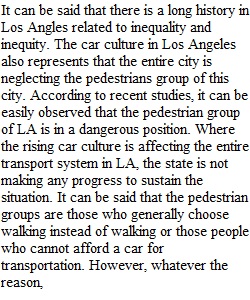


Q Wanda Coleman, royalty of Los Angeles poets, reading, "I Live for My Car" (3 minutes) Welcome to Week Two's Discussion, Writers! This is where we'll share focus ideas for our group work this semester. Every idea shared should be unique (please be sure to at least do a search for key terms before posting so that we do not have redundancies) and relate specifically to Los Angeles. If you are thinking, "what does 'specifically' mean?" that is great. It is a subjective term! Since Los Angeles is vast, anything might be made to specifically relate to it. If the specific connection between the idea you present and L.A. is not obvious, explain it to us. Make us understand (in other words, critically analyze and prove your thesis). I'm sharing a few texts related to the car culture of Los Angeles in this week's module ("Walking in L.A.," "The Pedestrian," and "I Live for My Car") to help prove that though there are other cities where urban sprawl prohibits pedestrians, Los Angeles has a unique relationship with what it means to own a car (or, have it own you) and what it means to travel by foot. The texts are useful but even if I could not find any, I could argue my point if necessary. However you go about it, if the specific connection between your topic and Los Angeles is not immediately apparent, prove it to us. I'm asking that by Thursday you share at least one idea and say a bit about why you think it is worthy of more exploration (250-500 words should do it). Then, by the end of the week, Sunday, you'll make at least one more post here. This time around, the post will be a response to a colleague's idea. In that second post, please do more than agree or disagree. Dig in, Expand on what is there. Elevate the conversation, deepen it, heighten it. Take it to another level! As usual, 250-500 words should do it. Behind the scenes, I hope you'll be communicating with your group about what topic(s) most interest you as a focus for our Trust Exercise group assignments. Keep in mind that you are not married to any topic you suggest nor to that discussed in any post you reply to. And, you are welcome to choose from the suggestions I offer. If you are do want to post about an idea I've shared this week, be sure you are adding on to what I've said to make the idea your own (and remember, first-come, first- served, no duplicates!). Also, if you are one of those who elected to get a copy of The City Beneath, a focus on this text, or some specific aspect thereof, is a perfect choice. Along with the aspect of car culture, may I present for your consideration: the Los Angeles riot. Whether or not your group chooses one of these events, it is important to gain an understanding of the many major riots in Los Angeles's history (and the very questionable labeling in the term "riot" itself). Here is a list, along with some questions to help get the exploration and analysis going. Think of these as seeds from which you might grow a topic for the Trust Exercise assignments and/or our projects and papers. 1. The Chinese Massacre of 1871. Can this be called the first riot in Los Angeles history? What was the social and political climate that precipitated this event? Who were the main groups involved? What was being resisted/challenged? How was the event brought to a close and who shares responsibility for the ensuing peace? How did this episode of unrest change the face, physically, politically and even spiritually, of Los Angeles? How does this event live on in our collective memory? Or does it? 2. The Zoot Suit Riots. What was the social and political climate that precipitated this event? Who were the main groups involved? What was being resisted/challenged? How was the event brought to a close and who shares responsibility for the ensuing peace? Who is responsible for the violence? What ties does it have to past occurrences of a similar nature? How did this episode of unrest change the face, physically, politically and even spiritually, of Los Angeles? How does this event live on in our collective memory? 3. The Watts Riot. What was the social and political climate that precipitated this event? When and where did it take place? What was being resisted/challenged? How was the event brought to a close and who shares responsibility for the ensuing peace? Who is responsible for the violence? What ties does it have to past occurrences of a similar nature? How did this episode of unrest change the face, physically, politically and even spiritually, of Los Angeles? How does this event live on in our collective memory? (Note! As with all of our topics, be sure to research the events leading up to the Watts unrest thoroughly. Check alternate sources for agreement before listing something as fact.) I look greatly forward to seeing what aspects of Los Angeles gain the spotlight this week. Have some fun with it!
View Related Questions